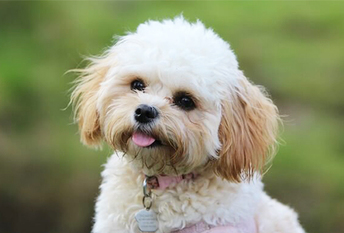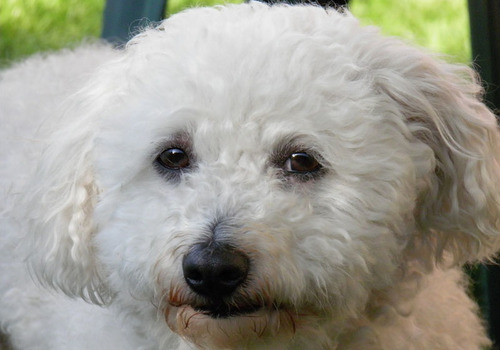The Bolognese has an all-white coat that is soft and fluffy like the texture of cotton. He is also “non-shedding,” so low to mild allergy sufferers should not be greatly affected. Bolognese coats are unshaped and untrimmed except for around their eyes for sanitary reasons.
Regular grooming is needed if the Bolognese is kept in its full coat. For easier maintenance, many people are satisfied with keeping their Bolo in a shorter coat of about one inch, leaving the untrimmed “mop head” around the face.
Beyond regular grooming, the occasional bath will keep your Bolognese clean and looking his best. Nails should be trimmed occasionally with a nail clipper or grinder to avoid overgrowth, splitting and cracking.
Ears should be checked regularly to avoid a buildup of wax and debris, which can result in an infection. Teeth should be brushed regularly.
Even though the Bolognese is not an especially active dog, he will tailor his activity level to meet yours. A daily walk should be enough to fulfill his exercise needs, but if you can’t make it outside that day, play time will help tire him out.
You’ll find that your Bolo will be a lot better mannered if he is taken out for regular walks. His small size and moderate activity requirements make him an ideal dog for urban areas and small living spaces, such as condos and apartments. As well, he likes to run around in a fenced-in yard or dog park.
As long as you feed your Bolognese a well-balanced diet, your dog will live a healthy and active life. These dogs do best on a high-quality kibble, but you may choose to go with a grain-free food as it may keep tear staining to a minimum.
The majority of Bolognese are healthy dogs, and aresponsible breederwill screen breeding stock for health conditions such as luxating patellas (compared to “trick knee” in humans) and eye anomalies.
Good breeders utilize health screening and genetic testing to reduce the likelihood of disease in their puppies.
You’ll be glad to hear that the Bolognese is an intelligent and highly trainable dog. He takes well to obedience training, especially when you’re using positive feedback, praise, petting and treats.
If you don’t take the lead and treat your Bolo like a dog, you run the risk of promoting small dog syndrome. This is when your small dog picks up human induced behaviors and believes he is a pack leader. Make sure your dog knows the rules, and enforce them gently and consistently.











